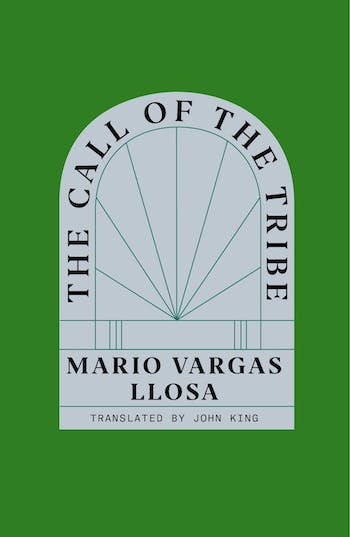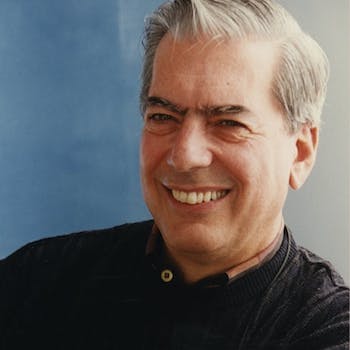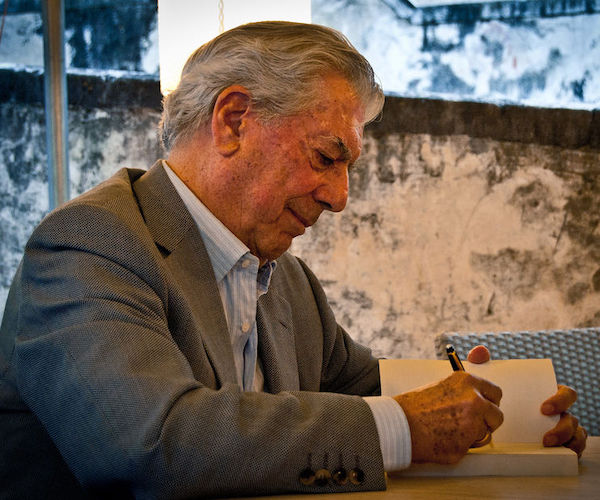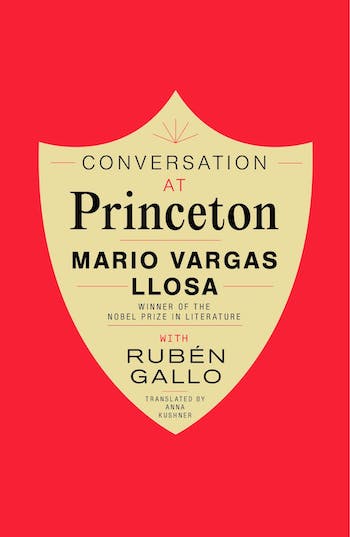Book Review: Two Powerful Books from Nobel Laureate Mario Vargas Llosa — A Liberal Citizen of the World
By David Mehegan
Engagingly written by a limpid stylist, The Call of the Tribe marshals a corps of sparkling intellectuals who have in common first-hand experience of dictatorship, a commitment to individual freedom, a belief in reasonably regulated free-market economies, and a rejection of the political zealotry of religion or the doctrinaire left and right.
The Call of the Tribe by Mario Vargas Llosa. Translated, from the Spanish, by John King. Farrar Straus & Giroux. 276 pp. $28.
Conversation at Princeton by Mario Vargas Llosa, with Rubén Gallo. Translated, from the Spanish, by Anna Kushner. Farrar Straus & Giroux. 260 pp. $28.
 A recent Boston Globe business column reported that some economists, “mostly progressives,” doubt there is a need for more inflation-fighting interest rate increases by the Federal Reserve. The sobriquet “Progressive” is everywhere these days, but it has nothing to do with the Progressive movement which, from around 1895 to 1920, reacted against the unrestrained capitalist rapacity of the Gilded Age. The movement stood for reform against child labor, corporate monopolies, contaminated food and drugs, sweatshops and environmental rape. It favored organized labor and women’s rights.
A recent Boston Globe business column reported that some economists, “mostly progressives,” doubt there is a need for more inflation-fighting interest rate increases by the Federal Reserve. The sobriquet “Progressive” is everywhere these days, but it has nothing to do with the Progressive movement which, from around 1895 to 1920, reacted against the unrestrained capitalist rapacity of the Gilded Age. The movement stood for reform against child labor, corporate monopolies, contaminated food and drugs, sweatshops and environmental rape. It favored organized labor and women’s rights.
Today, liberals prefer to label themselves “progressive,” apparently because they fear that the right has successfully redefined liberalism to mean hating America, a sinister blend of communism, atheism, and sexual perversion. Interestingly, there are proud conservatives but few proud liberals, so-called, at least in America. It is bracing, therefore, to be reminded in these two learned and captivating books of what liberalism always was and in some minds still is.
Peruvian-born novelist, scholar, historian, and Nobel laureate Mario Vargas Llosa, 86, lives mostly in Spain and has taken Spanish citizenship, but if there ever was a liberal citizen of the world, he is one. The first of these two books, arguably the richer, has two elements. First, it’s the tale of the young author, a college Marxist during the 1948-56 military dictatorship of Manuel Odría, who was thrilled by the 1959 triumph of Fidel Castro, then became disillusioned by Castro’s turn to political, social, and artistic repression. He came a convinced liberal and still describes himself as one. The bulk of The Call of the Tribe is devoted to explaining what that liberalism meant historically and could/should still mean today. Llosa undertakes this through a series of profiles of distinguished European liberals, some of whom he knew and all of whom he admired.
The list begins with enlightenment giant Adam Smith (1723-1790), then jumps to six 20th-century intellectuals: Spaniard José Ortega y Gasset (1883-1955), Austrian/American Friedrich August von Hayek (1899-1992), Austrian/Briton Karl Popper (1902-1994), Frenchmen Raymond Aron (1905-1983) and Jean-François Revel (1924-2006), and Latvian-born Briton Isaiah Berlin (1909-1997).
With the possible exception of Aron and Revel, these are vaguely familiar names to educated Americans, but I daresay not many have read their works. Few non-economists have read Smith’s 1776 Wealth of Nations. Many have internalized a couple of Berlin’s memorable titles — The Crooked Timber of Humanity and The Hedgehog and the Fox — but even his books aren’t sitting on the shelves seen behind interviewees on the PBS News Hour. My town library has two volumes of Berlin, plus a volume of interviews. Of the other writers’ works I find one by Hayek, The Road to Serfdom: Text and Documents; three by Ortega y Gassett; one by Popper, The Open Society and Its Enemies; Raymond Aron, none; one by Jean-François Revel, How Democracies Perish. That’s not bad, and if I search all formats I can find what I want. But public libraries have limited space for books that nobody borrows and you won’t find these writers on most bookstore shelves (remember bookstores?).
That is not surprising. Most people don’t form political opinions and affinities as Vargas Llosa did: by melding personal experience of freedom and dictatorship with direct research, personal connections with intellectual giants, and a lifetime of deep reading. What most of us do is follow our parents’ or friends’ political inclinations.
That is why The Call of the Tribe is worthy and useful. Engagingly written by a limpid stylist, it marshals a corps of sparkling intellectuals who have in common first-hand experience of dictatorship (Jewish-born Hayek, Popper, and Aron all fled the Nazis), a commitment to individual freedom, a belief in reasonably regulated free-market economies, and a rejection of the political zealotry of religion or the doctrinaire left and right. They’re all, in other words, liberals.
This might not comport with the outlook of those who implicitly concede the rightist view of liberalism as the enemy of wealth, business, religion, personal freedom, and the friend of overweening government power. Except for the enemy-of-freedom part, that actually describes more closely a small group which the Pew Research Center calls the Progressive Left (6 percent of Americans, by Pew polling) in its Political Typology register.[1] That group, typified (for example) by Elizabeth Warren and Bernie Sanders, strongly believes in government action to remedy social ills and tends to blame wealth and corporate greed for every bad thing, from inflation to climate change. The much larger “types” in the Pew system are Establishment Liberals and the Democratic Mainstay. These two groups (Pew polling finds them to constitute 29 percent of Americans) are committed to individual freedom along with the rule of law, strongly reject totalitarianism, often have nuanced views on fraught issues such as abortion and immigration, are impatient with language police, resistant to excessive government interference in private life, and don’t see capitalism as necessarily a sinister bogeyman.
The size of this group, if the polling is correct, would seem to disprove the cliché that America is utterly polarized. Divided, yes, but if it were truly polarized, everyone would be a Trumpite or a Sandersite, and Joe Biden could not have been elected president.

Author Mario Vargas Llosa. Photo: Morgana Vargas Llosa
Mario Vargas Llosa is not in Pew’s system, of course — and he and his heroes (in this book at least) have little to say about American politics — but he and they correspond closely to the broadly centrist liberal grouping, what liberals used to be in the Hubert Humphrey, Harry Truman, Jack Kennedy (and Joe Biden) mold. It would surely shock Ronald Reagan and Margaret Thatcher to know that Vargas Llosa counts them as admirable liberals in their opposition to Soviet power, suspicion of intrusive government, and commitment to private enterprise and personal freedom (though he was appalled that Reagan’s favorite author was Louis l’Amour). He would doubtless call Liz Cheney a liberal (as would the Trumpites).
Some readers might be puzzled that Adam Smith heads the pantheon. Vargas Llosa sees him as a pioneering proto-liberal, shy and humane, with a highly developed sense of justice. “There is still the mistaken idea,” Vargas Llosa writes, “that Adam Smith was first and foremost an economist — he is called ‘the Father of Economics’ — something that would have amazed him. He always thought of himself as a moralist and a philosopher.”
Vargas Llosa writes that Smith’s now forgotten first book, The Theory of Moral Sentiments (1759), is a study of how human relationships “allow a society to function and to develop a sense of basic solidarity, which prevents it from breaking up and disappearing. It is also a study of the moral sentiment that allows us to differentiate between good and evil, falsehood and authenticity, and truth and lies.”
Spaniard political theorist Ortega y Gasset offers a lesson in how hard it sometimes is to maintain the liberal stance against the pressure of left and right. Like George Orwell in Homage to Catalonia, he supported the Spanish Republic but deplored the violent extremism of both ends in the civil war. Unlike Orwell, who could go home to England and express his view openly, the exiled Ortega returned to Spain after World War II but found that he could not publicly maintain his opposition to the falangist regime of Francisco Franco.
Raymond Aron, from an assimilated Jewish background, is one of Varga Llosa’s liberal lions who maintained his integrity and his intellectual standards against all challenges and personal costs. A lover of German culture in the interwar period who had studied and taught in Germany, he was forced to evacuate with the Free French to London ahead of the German onslaught of 1940. After the war, back in France, he was a fearless but lonely figure in the intellectual scene, which was dominated by the left.
“He was a somewhat eccentric thinker within the French tradition that adores extremes,” writes Vargas Llosa, “a liberal and moderate, a champion of that Saxon political virtue common sense [sic no “Anglo”], an amiable skeptic who, without always much luck, but with great wisdom and lucidity, defended for more than half a century in books, articles, and lectures — in academia and in journalism — liberal democracy against dictatorships, tolerance against dogmas, capitalism against socialism, and pragmatism against utopias.”
Jean-Francois Revel was an academically-trained but not -employed veteran of the wartime Resistance, an intellectual who, like Aron, was for a time a virtual pariah for yanking the beards of the fashionable leftists of postwar France, some of whom, such as Sartre, famously made excuses for Stalin’s terror. Vargas Llosa writes that Revel’s book, Why Philosophers? (1957), “revealed to the world a formidable pamphleteer in the style of Voltaire, cultured and pugnacious, ironic and lapidary, where the richness of his ideas and his questioning spirit were expressed in a terse and at time incandescent prose.” Two of his celebrated liberal apologias were The Totalitarian Temptation (1976) and How Democracies Perish (1983).
Although Vargas Llosa’s great liberals are expert analysts of systems and structures, they and he believe that the taproot of dictatorship is fear of freedom, the universal craving for a faith-based system of absolute authority, and the irrational passions of the human heart. Hence his title, The Call of the Tribe.
“This is the term,” he writes, “given by Karl Popper to the irrationality of the primitive human being that nests in the most secret recesses of all civilized people, for we have never completely overcome that yearning for the traditional world — the tribe — when men and women were still an inseparable part of the collective, subordinate to the all-powerful sorcerer or chief who made every decision for them, where they felt safe, free of responsibilities, submissive, like animals in a pack or herd, like human beings in gangs or a football crowd [we might add in a mob assaulting the Congress], lethargic in the midst of those spoke the same language, worshipped the same gods and hated outsiders, people different from them whom they could blame for all the calamities that befell the tribe.”

Mario Vargas Llosa in 2010. Photo: WikiCommon
Vargas Llosa’s liberals have in common a suspicion of overarching intellectual (or religious) theories — such as Marx’s conviction that class warfare controls all of history. Popper, especially, was implacably against what he called historicism. This is the idea, Vargas Llosa writes, “that history is written and follows a script conceived by God or is determined by social and economic forces against which individual actions cannot prevail…. Popper lucidly defends the reformist method — both democratic and liberal — of a gradual and consensual transformation of society against the revolutionary desire to change society in an immediate, total, and definitive way.” Popper writes in The Poverty of Historicism, “Once we realize that we cannot make heaven on earth but can only improve matters a little, we also realize that we can only improve them little by little.” This is the sense and sensibility suggested by Isaiah Berlin’s title, The Crooked Timber of Humanity, which is taken from a statement by Enlightenment philosopher Immanuel Kant: “From the crooked timber of humanity nothing straight was ever made.”
As did Hayek, Popper rejected the idea of planning — inferred by Vargas Llosa to mean “the controlled and scientific ordering of social evolution. Whenever it is imposed it always leads to the destruction of freedom and to totalitarian regimes.” This tendency, Vargas Llosa writes of Popper’s view, “is historicist through and through because it supposes that history cannot just be predicted but also directed and planned like a work of engineering.”
In all these intellectuals, Varga Llosa finds, the liberal resistance to top-driven change is based upon what Popper called “’the moral framework,’ a profound sense of justice and social sensibility that a society has developed throughout its history.” (See Adam Smith’s “moral sentiments,” above.) He points out that “the delicate, deeply rooted psychology and mood of a society cannot be abolished or abruptly replaced as revolutionaries might wish. For in the final instance, it is the way in which institutions resonate with these traditions that determines whether they succeed or fail.” They will “achieve their goals only if they are closely attuned to that ineffable, unwritten ‘moral framework’ that is so decisive in the life of a nation.”
This premise is prominent, Vargas Llosa writes, in the writings of Berlin, “a great liberal. This clearly is a matter of pride for those of us who think that liberal doctrine is the symbol of democratic culture — of tolerance, pluralism, human rights, individual sovereignty, and legality — the flagship of civilization.” Unlike Hayek, however, Berlin did not believe that the free market was the guarantor of moral, political, and social progress, or that every kind of freedom is a good thing: freedom for the wolf, he noted, is death to the sheep. He was, Vargas Llosa writes, “a moralist as well as a convinced rationalist. Although he did not say this in so many words, it is clear from his glowing portraits [of such luminaries as Winston Churchill, Chaim Weizmann, Albert Einstein, Aldous Huxley, Anna Akhmatova, Maurice Bowra, and Boris Pasternak in Personal Impressions (1980)] that, for him, it is difficult, perhaps impossible, to disassociate the intellectual and artistic greatness of individuals from their ethical probity.” In contrast, dictators and their fawning admirers (such as Donald Trump toward Vladimir Putin) tend to be moral imbeciles.
Vargas Llosa’s liberals are not perfect. His profiles reveal human and humane errors, weaknesses, and inconsistencies along with intellectual strengths and courageous characters. They are not gods but men who feared and loathed any form of repression, which is always allied with lies, cruelty, and corruption, and who probed deeply its infernal tendencies and underpinnings.
 There is an enormous amount to be learned from this book, which should lead (it will for me) to the reading of many of the source texts. The second book, Conversation at Princeton, is fascinating as a set of revelations of Vargas Llosa’s massive literary output, working methods, and the complex interaction of his fiction with the history he has known.
There is an enormous amount to be learned from this book, which should lead (it will for me) to the reading of many of the source texts. The second book, Conversation at Princeton, is fascinating as a set of revelations of Vargas Llosa’s massive literary output, working methods, and the complex interaction of his fiction with the history he has known.
A frequent visiting professor and lecturer at American universities, Vargas Llosa was at Princeton in 2014 when he learned that he had won the Nobel Prize. In the fall semester a year later, he and Professor Rubén Gallo conducted a seminar with graduate students who were assigned to read several of Vargas Llosa’s novels and to participate with him and Gallo in a deep dive into the works and their organic connection with history and politics. Edited and condensed by Gallo, the conversations are a fascinating window, not only into Vargas Llosa’s biography and break with Marxism, but also into the way in which literary fiction, given its moral, emotional, and psychological insights, can bring more truth to history than any mere recital of the facts.
He is a liberal and a democrat, but Vargas Llosa is not naïve. He compares Putinist Russia to the repressive tradition of the Romanovs. One can only wonder at his reaction to current events in Peru, wracked with violence and political conflict after an elected president tried to dissolve the legislature and rule by decree. In 2015 he said, hopefully, “Peru nowadays and the Peru from Conversation in the Cathedral [a 1969 novel set at the time of the Odría dictatorship] are very different, for the better fortunately. At that time there was a dictatorship; now there is a democracy that can be imperfect but that is preferable to the previous system.” With crowds in the streets of Lima demanding the government’s ouster, and the government’s defensive use of force, today democracy hangs in the balance.
In our country, January 6, 2021 was doubtless a reminder which we might well take to heart: that the call of the tribe is never silenced. “No country,” Vargas Llosa tells the Princeton students, “no matter how advanced it is, is completely immune against a dictatorship. The possibility always exists that, despite institutions, a demagogue or a fascist will come to power. … Dictatorships are not a phenomenon of the past. They are still there, very present, as a latent danger that can manifest itself at any moment. From among all the institutions of civilization, democracy is one of the most fragile: it is a very fine film that can be broken and leave exposed humanity’s oldest tradition, that of dictatorship. Democracy is a modern phenomenon, very recent and very localized. The archaic tradition is the club, brute force, authoritarianism.”
David Mehegan PhD is the former book editor of the Boston Globe. He can be reached at djmehegan@comcast.net.
[1] See https://www.pewresearch.org/politics/2021/11/09/beyond-red-vs-blue-the-political-typology-2/
Tagged: Conversation in Princeton, David Mehegan, Mario Vargas Llosa

